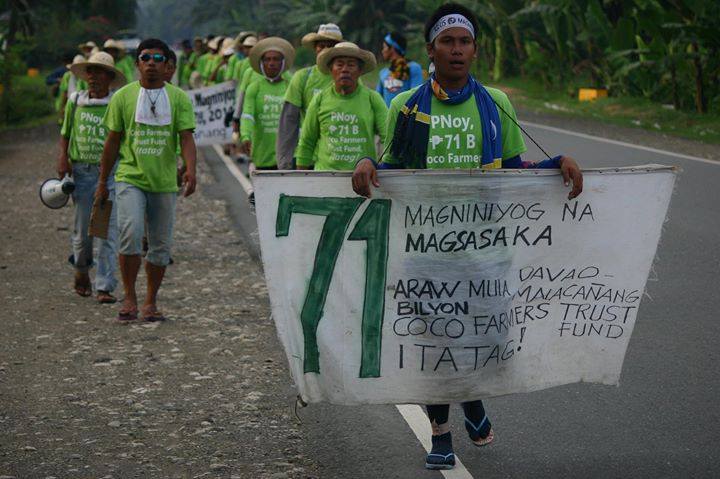Photo from the KM71 Martsa ng Magniniyog Facebook page
THE ATENEANS for Agrarian Reform Movement (Afarm), in partnership with Buklod Atenista, released a manifesto on November 5 in support of the Kilusan para sa Ugnayan ng mga SamahangMagniniyog (Kilus Magniniyog) in light of the coco levy fund scam.
Seventy-one farmers from Kilus Magniniyog, a coalition of coconut farmer organizations, began marching from Davao to the Malacañang Palace on September 21 to raise awareness on the issue.
According to the manifesto, the coco levy fund scam occurred for nine years during the Marcos regime; a portion of the original P9.7 billion coco levy has grown to over P150 B today.
According to a primer sent by Afarm Chair Ace Dela Cruz to The GUIDON, the coco levy fund was invested in San Miguel Corporation and other business which are unrelated to coconut farming.
In September 2012, P71 B was recovered from the Coconut Industry Investment Fund-San Miguel Corporation shares and was declared by the Supreme Court as a public fund for the benefit of the coconut farmers and the development of the coconut industry.
However, the manifesto states that the farmers have not yet received a single peso from the recovered money.
The manifesto also echoes Kilus Magniniyog’s call for the establishment of the Perpetual Coconut Farmer’s Trust Fund, which will protect the recovered P71 B from further misuse or dissipation.
The trust fund will also ensure that annual earnings from the recovered fund will be given only for the direct benefit of farmers and their families.
In an interview with The GUIDON, Dela Cruz said that the manifesto serves as Afarm’s “solidarity message to our farmers and a petition letter that outlines [their] demands for faster and more efficient government action.”
Afarm is a student-led task force of rural development advocates from the Ateneo, while Buklod Atenista is an alliance of the student governments from the Ateneo de Manila University, Ateneo de Davao University, Ateneo de Naga University, Ateneo de Zamboanga University and Xavier University-Ateneo de Cagayan.
Levy
According to the primer, the government required coconut farmers to pay a levy of P20 in 1974 until the levy increased to P76 in 1977.
The collected coco levy was supposed to support the farmers and the development of the coconut industry. Instead, the coco levy fund was used to build infrastructure “to develop a monopoly” on the coconut industry.
The primer names the United Coconut Planters Bank (UCPB), with Eduardo “Danding” Cojuangco as its president, as one such infrastructure.
Currently, the UCPB serves as one of the largest commercial banks in the Philippines.
Gaining awareness
“[President Benigno “Noynoy” Aquino III’s] administration has been very silent about the issue, and for us, this is quite alarming,” said Dela Cruz.
Dela Cruz also mentioned that Cojuangco, who was directly involved in the coco levy fund scam, is the president’s uncle.
Dela Cruz is hopeful that this issue will gain more awareness even after the marchers have already reached the Malacañang Palace.
“In fact, what we are doing right now is just the beginning. More than echoing their concerns to the Ateneans from all over the Philippines, we, in [Afarm], also want to connect personally with these farmers,” he said.
According to Dela Cruz, Afarm is currently planning to conduct consultations among different sectors involved in the issue.
Afarm also hopes to craft policy proposals that can give the farmers an idea of how they can maximize the potential and utilization of their coconut farms.
“Rest assured that as long as this network of rural development remains and the Ateneans stays true to their commitment of advocating for social justice, the fight for our coconut farmers continues,” said Dela Cruz.







